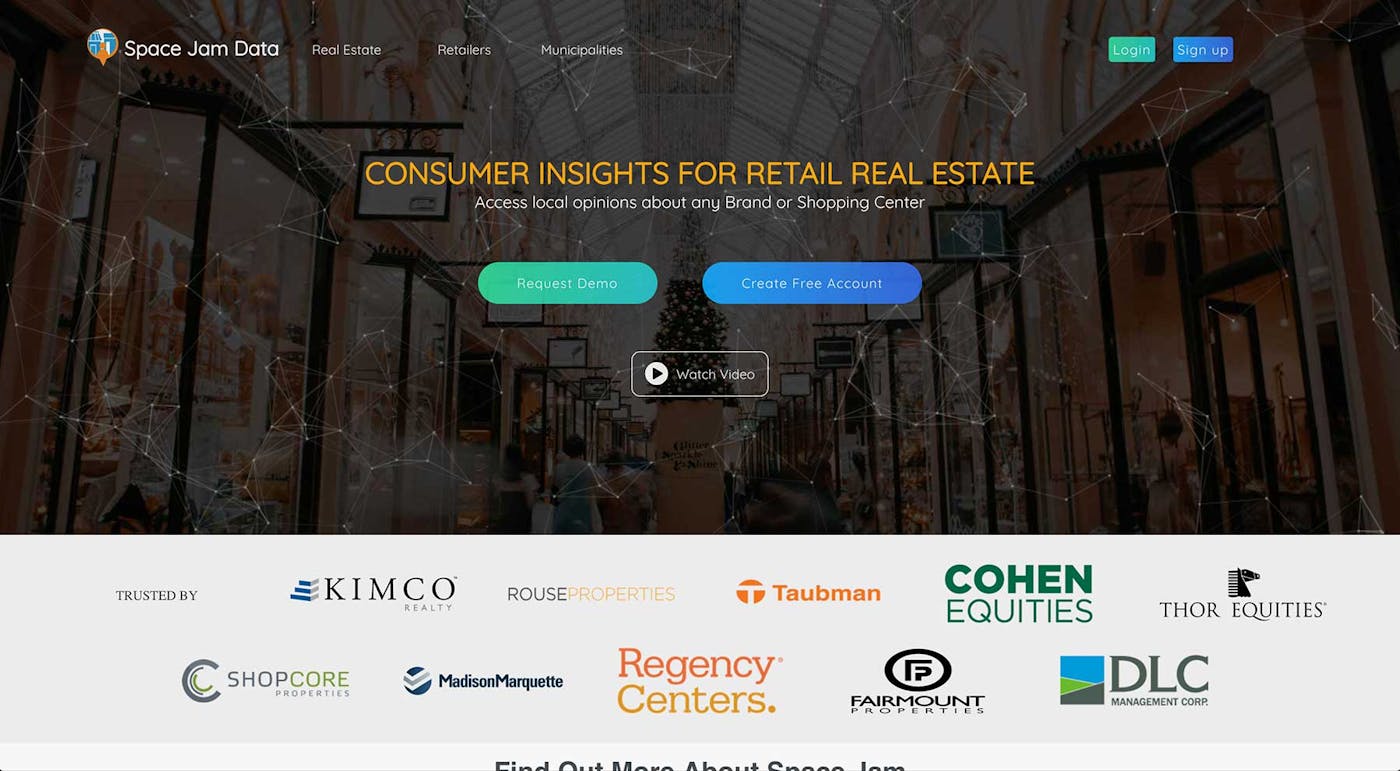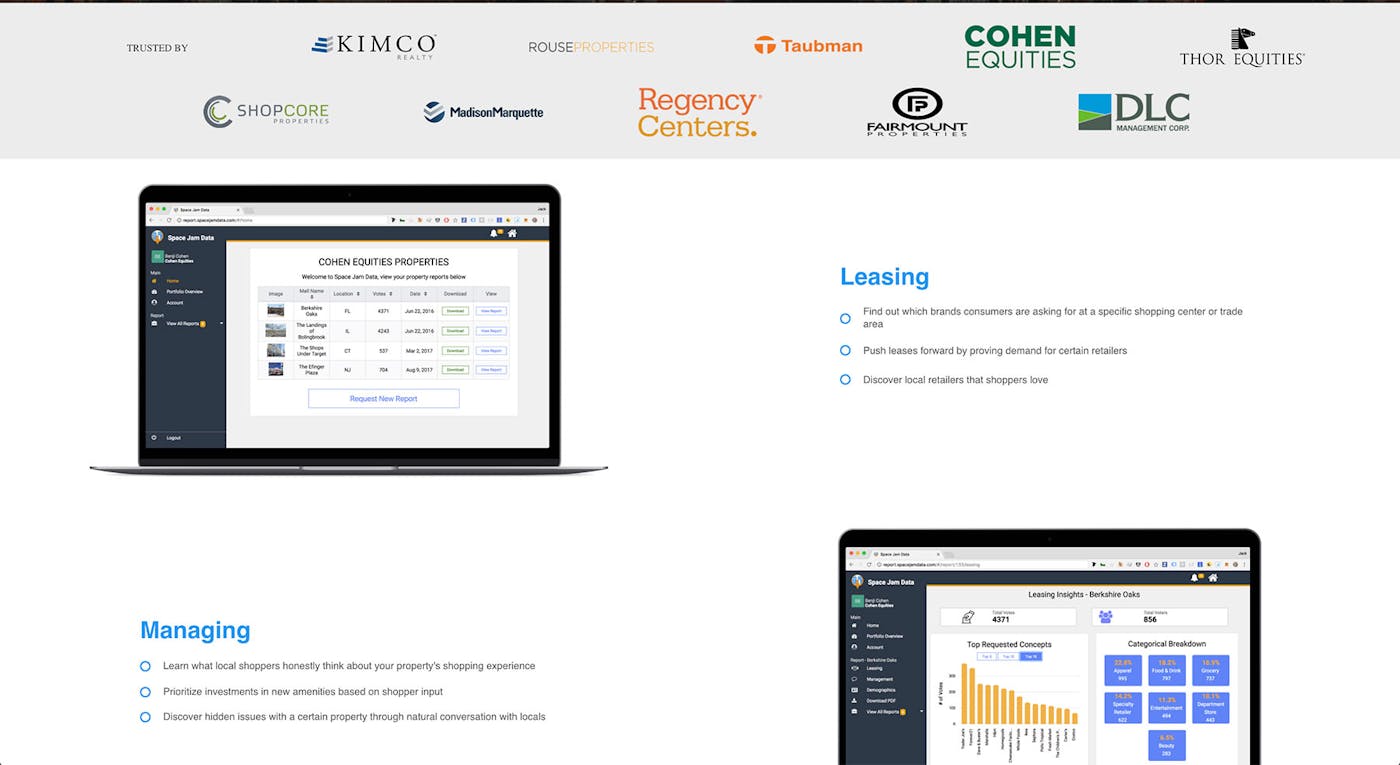Growing My B2B Real Estate Crowdsourcing Tool to
$25k/mo
Hello! What's your background, and what are you working on?
Hey Courtland! I'm Jack Clancy, co-founder of Space Jam Data. Before working on Space Jam full time, I was attending USC while working as a freelance front-end developer.
Currently, I'm the CTO of Space Jam Data — a real estate crowdsourcing tool that allows retail real estate professionals to have natural conversations with their local shoppers, and measure their desire for certain types of retailers.
Space Jam uses geo-targeted social media advertisements to gather data around a particular center. We then use a proprietary NLP pipeline to analyze the raw text data and aggregate that into a dashboard for our customers to analyze. We work mainly with a wide range of real estate companies who use our tool to help inform their retail leasing efforts and customer experience management.
It's been close to two years since the inception of Space Jam, and we now work with a number of the largest REITs and real estate private equity companies in the United States, with revenues at over 20,000/month.

What motivated you to get started with Space Jam Data?
When I was studying abroad in Shanghai, I became close friends with one of my classmates, Benji Cohen. We frequently bonded over our mutual interest in technology and its role in society.
We stayed in touch after going home, and about six months after returning to the US, Benji contacted me about the idea for Space Jam Data. He was working in SF as a part of Babson College's incubator, a ("tech semester abroad"). I had absolutely no knowledge of commercial real estate before Space Jam, but Benji had grown up with commercial real estate ingrained in his DNA.
Our very first steps in validating the product were seeing if anyone would be interested in a dataset like we were providing. We reached out to a variety of companies we thought might be interested and provided them with a very early version of the product for free. People showed interest in the dataset, so we went about making the product surrounding that dataset more robust so that our customers could extract more value.
We spent close to six months iterating on the technology and product, working closely with our desired customers to create something of value for them. We didn't start asking for money until we had convinced them that there was ROI.
To me, this seems like a very unconventional way to go about building a business, but we weren't exactly a conventional team. We were a group of totally unproven recent college graduates attacking one of the hardest B2B industries around.
I think the biggest thing I learned from this experience is that there is no cookie-cutter method to successfully getting your first sales — it depends on a variety of circumstances that may be industry-specific.
Real estate (in particular commercial real estate) is a very old-school industry for the most part.
What went into building the initial product?
The first six to nine months of working on Space Jam Data was a concerted effort to validate the product and dataset we were offering. We spent all of our time either building/improving our technology or reaching out to sales leads. In this initial validation period, we didn't ask any users for money, just to help us improve the product.
We tried to be extremely lean in terms of engineering for as long as possible. The first few iterations of our product were hard-coded HTML pages disguised as a web app. We also began manually collecting the data via Excel, which was extremely time consuming.
Once we felt we'd achieved product-market fit, we began to scale up our engineering resources by bringing on another engineer, Orson, who specialized in data and helped us build out our NLP pipeline. Luckily, we were all in college during the advent of Space Jam, which provided us with financial support and enough time to dedicate to the project.
How have you attracted users and grown Space Jam Data?
I don't think we ever had an official launch since we built the product in a highly iterative fashion, but probably the most momentous occasion of Space Jam's early days was receiving our first check for a property report.
As an enterprise app, our user acquisition process looks drastically different from something consumer facing. Our user numbers are also much lower, but our VPAU (Value per Active User) is much higher.
Two of the most effective user acquisition strategies we used were:
- Providing cold leads a free Space Jam report and to get the relationship started and upselling from there.
- Using networking to get introductions to people we wanted to sell to.
For any aspiring entrepreneurs out there that are thinking about how to attract users to their growing business, I'd recommend being as persistent and patient as possible. User acquisition is probably one of the most difficult aspects of starting a business. Find what works for you and run with it.
What's your business model, and how have you grown your revenue?
We make money by charging our customers a fee for every property they crowdsource data for.
When we first started off with Space Jam Data, we would make free data reports to get in the door with prospects without asking for anything in return. After customers started to see the value in the data reports they agreed to pay a price for future reports. This "sampling" strategy has been effective, and we still employ it in our sales cycle.
Our pricing strategy really wasn't that scientific. We landed on a price point through an ongoing negotiation with what our customers were willing to pay while still providing ourselves with healthy margins.
Today we make roughly $20k/month and we expect that number to grow. Assuming a low basis figure for year one revenue, we have experienced close 232% YoY revenue growth rate. What's most exciting about our revenue growth is that through each transaction we simultaneously increase our enterprise value by aggregating more data.
Revenue growth is due but not limited to the following:
- Customer trust: the longer we stick around as as a business the more our customers trust we will be around to continue innovating and helping them. Time also creates opportunities for ROI case studies and for word of mouth exposure among our market.
- Improvements/updates: Most of our product updates are driven by feedback from our customers. Whenever we have a market-driven product update, we make sure to share it with potential customers, and it usually helps our case in making a sale.
- Decreased learning curve: many of the time- and thought-consuming processes of trying to sell product lessen or disappear once you start gaining more experience.

Here are some more high-level data points:
- On average, $10,000/customer
- Roughly 40% of our clients are NYSE-listed companies
- 232% YoY revenue growth
- Gross margin: between 50-60%
Advice: Employ a healthy balance of thoughtful reflection and constant action. Make something that you can make money on from day one, and then allow your customers to pay for your growth. If you work diligently and consistently, large opportunities will present themselves.
What are your goals for the future?
We're currently making a push to decrease the amount of human intervention needed in the report creation process, which will be a big step forward for us in terms of operations.
This comes in the form of building out an internal application that will monitor and help automate every step of our operational workflow.
Another big milestone for me personally would be hitting $1M+ revenue/year. Still a long way to go for that one though. :)
If you had to start over, what would you do differently?
Space Jam Data has probably been one of the greatest learning journeys I've ever gone on, and it's definitely the most self-directed.
I wish we'd started out with more technical expertise. I was a huge n00b at the beginning, and it led to a lot of bad engineering choices that dragged us down for a long time. Fortunately, we remained positive, and I tried to learn as much as possible from the mistakes I made.
As of today, both our customer-facing and internal platforms are more robust and fault tolerant than they've ever been. It gives me a really great sense of fulfillment to know that I've grown as an engineer, but there's still a long way to go.
Have you found anything particularly helpful or advantageous?
We made a lot of good and bad decisions while starting off, but I'll start with the bad: We spent a lot of time building out complex features that we thought were great, but our end users didn't really find helpful. But as in life, we learned from our mistakes.
Now, before writing a single line of code we validate every feature that we integrate into our client-facing platform in order to try and optimize our engineering resources.
I think one of the most important habits to get into at a startup is a culture of constant communication. Our slack is almost never silent, and it helps keep everyone motivated and on the same page.
This many come as a surprise to many, but we believe one of the most helpful external market trends to our business is the ever-increasing dominance of Amazon in the retail market. As property owners across the country have become more and more fearful of their business being eaten by e-commerce, it has forced them to become much more data-driven and analytical about their decisions, as one bad lease could lead them down the path of bankruptcy.
What's your advice for indie hackers who are just starting out?
I think people are understanding the initial validation process more and more, but a big mistake I see people making is over engineering/building their initial product.
Keep the scope as small as possible and don't worry about building the perfect code base from the get-go. Your business requirements and features will be in a constant state of flux at the beginning, so keep it simple. As Paul Graham famously said, "Do things that don't scale."
Where can we go to learn more?
Website: http://spacejamdata.com
Twitter: https://twitter.com/jack_clancy93, https://twitter.com/benjicohen421
Email: [email protected]
Let us know if you have any questions about Space Jam!
